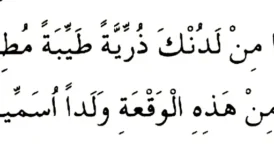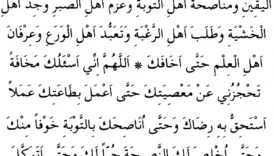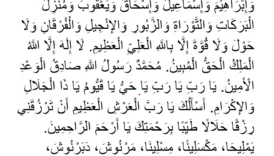Al-i Imran Surah: Significance, Virtues, and Key Verses
General Introduction to Al-i Imran Surah
Al-i Imran (often spelled “Aal Imran”) is the third chapter of the Holy Qur’an and consists of 200 verses. It was revealed in Medina, likely beginning after the Battle of Badr and continuing intermittently up until the 9th year of the Hijrah. The surah is named “Al-i Imran,” meaning “The Family of Imran,” referenced in verses 33–34.
- Al-i Imran Surah: Significance, Virtues, and Key Verses
- General Introduction to Al-i Imran Surah
- Other Names and Their Significance
- The “Ism al-Azam” (Greatest Name of God) Verses in Al-i Imran
- Angels Who Will Seek Forgiveness Until Judgment Day
- (Verse 18 of Al-i Imran)
- Seeking Wealth, Dominion, and Authority through Al-i Imran
- (Verse 26 of Al-i Imran)
- References
In the standard compilation of the Qur’an, Al-i Imran is the 3rd surah, while in chronological order it is the 89th. It is the second-longest surah after Surah al-Baqarah and touches upon themes of faith, the Oneness of God, the role of the prophets, and the relationship between this world and the afterlife.
Other Names and Their Significance
Based on various narrations, Al-i Imran is also known by several other names due to its content and virtues, including:
- Kenz (Treasure)
- Eman (Security or Assurance)
- Tayyiba (Purity)
- Surat al-Istighfar (due to mention of those who seek forgiveness at dawn)
- Zehra (The Radiant), highlighting its gleaming light of guidance
The “Ism al-Azam” (Greatest Name of God) Verses in Al-i Imran
Prophet Muhammad (peace be upon him) mentioned that certain verses in the Qur’an contain Ism al-Azam—the Greatest Name of Allah. Two such verses, read in succession, are particularly emphasized:
بِسْمِ اللّٰهِ الرَّحْمٰنِ الرَّحِيمِ
Ve ilahüküm ilahün vahıd. La ilahe illa hüverrahmanür rahıym.
(Reference: Surah al-Baqarah, 2:163)
اللَّهُ لَا إِلٰهَ إِلَّا هُوَ الْحَيُّ الْقَيُّومُ
(Reference: Surah Al-i Imran, 3:2)
Transliteration (Latin letters, line below Arabic):
Bismillahirrahmanirrahim.
Ve ilahüküm ilahün vahıd. Lâ ilâhe illâ hüverrahmânür rahîm.
Allâhü lâ ilâhe illâ hüvel hayyul kayyûm.
Meaning (English):
“In the name of Allah, the Most Compassionate, the Most Merciful. Your God is one God. There is no deity except Him—the Most Compassionate, the Most Merciful. (Also,) Allah—there is no god except Him, the Ever-Living, the Sustainer of all.”
The Prophet (peace be upon him) said about these two verses:
“Without doubt, these two verses contain the Greatest Name of Allah (Ism al-Azam).”
(See Tirmidhi, Supplications [Da’awat], 112)
He also taught:
“Recite the two bright gardens—these are Surah al-Baqarah and Surah Aal Imran. On the Day of Resurrection, they will come as two white clouds or two shades over those who recite them, shielding them from the intense heat of that day.”
(See Muslim, Musafirîn, 253; Tirmidhi, Fadā’il al-Qur’an, 5)
Angels Who Will Seek Forgiveness Until Judgment Day
(Verse 18 of Al-i Imran)
Among the many powerful verses in this surah, verse 18 stands out for its unique blessing:
بِسْمِ اللّٰهِ الرَّحْمٰنِ الرَّحِيمِ
شَهِدَ اللّٰهُ أَنَّهُ لَا إِلٰهَ إِلَّا هُوَ وَالْمَلٰئِكَةُ وَأُولُوا الْعِلْمِ قَائِمًا بِالْقِسْطِ ۚ لَا إِلٰهَ إِلَّا هُوَ الْعَزِيزُ الْحَكِيمُ
Transliteration (Latin letters, line below Arabic):
Bismillahirrahmanirrahim.
Şehidallâhü ennehu lâ ilâhe illâ hüve vel melâiketü ve ülül ilmi kâimen bil kıst. Lâ ilâhe illâ hüvel azîzül hakîm.
Meaning (English):
“Allah (Himself) testifies that there is no god except Him, as do the angels and those endued with knowledge. (He is) upholding justice. There is no deity but Him—the Almighty, the Wise.”
The Prophet (peace be upon him) said of whoever recites this verse:
“The Most Exalted Allah creates 70 angels for that person who recites this verse. These angels continue to seek forgiveness (istighfar) on their behalf until the Day of Judgment.”
(See Tafsīr at-Tabarī, Volume 3, p. 45)
Seeking Wealth, Dominion, and Authority through Al-i Imran
(Verse 26 of Al-i Imran)
This surah highlights that wealth, dominion, and worldly power all belong solely to Allah, who grants or withholds them according to His wisdom. Verse 26 offers a profound supplication:
بِسْمِ اللّٰهِ الرَّحْمٰنِ الرَّحِيمِ
قُلِ اللّٰهُمَّ مٰلِكَ الْمُلْكِ ۚ تُؤْتِي الْمُلْكَ مَنْ تَشَٓاءُ وَتَنْزِعُ الْمُلْكَ مِمَّنْ تَشَٓاءُ ۚ وَتُعِزُّ مَنْ تَشَٓاءُ وَتُذِلُّ مَنْ تَشَٓاءُ ۚ بِيَدِكَ الْخَيْرُ ۚ اِنَّكَ عَلٰى كُلِّ شَيْءٍ قَدِيرٌ
Transliteration (Latin letters, line below Arabic):
Bismillahirrahmanirrahim.
Kulillâhümme mâlikel mulk. Tü’tîl mulke men teşâü ve tenziul mulke mimmen teşâü ve tu’izzu men teşâü ve tu’zillu men teşâü. Bi yedikel hayr. İnneke alâ külli şey’in kadîr.
Meaning (English):
“Say: ‘O Allah, Lord of sovereignty! You grant sovereignty to whom You will and You take it away from whom You will. You honor whom You will and You humble whom You will. In Your hand is all good. Truly You have power over all things.’”
Virtues of This Verse:
- It is considered among those verses containing Ism al-Azam (the Greatest Name of Allah), so du’as (supplications) made with it are especially blessed and accepted.
- Anyone who regularly recites this verse to its completion, if already in a position of authority or wealth, will find that Allah safeguards his or her dominion from harm.
- If one does not have power or wealth, Allah may grant it to them and protect it from enemies.
- Reciting Surah Al-i Imran, in general, brings numerous blessings: on the Day of Resurrection, for each verse recited, a person will be granted safety while crossing the Sirat (the bridge over Hellfire).
- It is also reported that whoever recites Al-i Imran on a Friday, Allah’s mercy will continue to descend upon them until sunset, and the angels will ask forgiveness on their behalf.
References
- Tafsīr at-Tabarī (Volume 3, p. 45 and onward)
- Ibn Kathīr’s Tafsīr (Commentary on Surah Al-i Imran)
- Elmalılı Muhammed Hamdi Yazır, Hak Dini Kur’an Dili (Exegesis of Al-i Imran)
- Muslim, Musafirīn
- Tirmidhi, Fadā’il al-Qur’an
- Tirmidhi, Da’awāt
(All narrations on the virtues and merits of Surah Al-i Imran can be found in the sections discussing this surah in these classical works.)
By reflecting on the passages of Al-i Imran, believers can discover invaluable guidance for both worldly life and the hereafter. Its verses encourage sincerity in faith, mindfulness of Allah’s absolute power, and consistent practice of remembrance and supplication. Reciting and understanding this surah paves the way toward deeper spiritual fulfillment and divine mercy.





